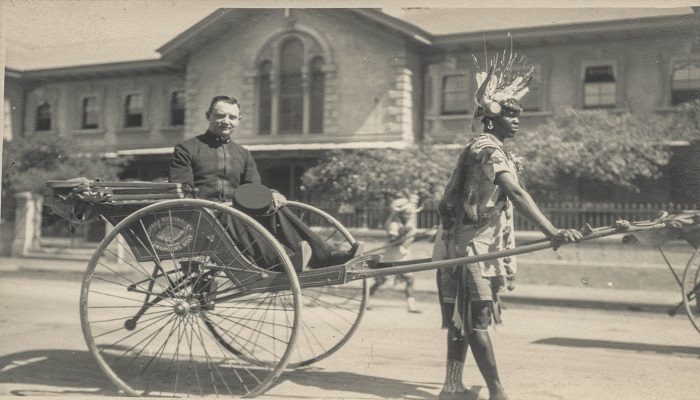
Eurafrica: The Untold History of European Integration and Colonialism
Peo Hansen and Stefan Jonsson
London: Bloomsbury, 2014
This aim of this book is to reverse the ‘historical amnesia’ (p.xix) concerning the relationship between the EU and colonialism, and recover the ‘colonial and geopolitical dimensions’ of the history of European integration (p.3). In so doing, Hansen and Jonsson challenge the dominant narrative of EU history, which concentrates on peace and cooperation in the post-war era rather than rivalry and imperial ambition, and largely ignores the processes of colonialism and decolonisation (pp.4-5). In order to replace this ‘selective and one-sided interpretation of the EU’s past’ (p.4), the authors focus on the history of Eurafrica, a ‘long forgotten or suppressed’ ‘political project and geopolitical constellation’ (p.5). According to Hansen and Jonsson, the Eurafrican project, within which the relationship between Europe and Africa was reconceived during the twentieth century, was ‘constitutive both of the European integration project or the EU itself and of the foundation of postcolonial Africa’ (p.8). Eurafrica is also a methodological approach that enables the authors to challenge national, continental and Eurocentric categories (p.10), whilst simultaneously offering an empirical challenge to the binary between Europe and Africa that can be used alongside ‘the anti-colonial, postcolonial or decolonial deconstructions of European colonial epistemologies’ (p.12). The critical concept of Eurafrica posited in this book is therefore, according to its authors, of benefit to scholars of Europe and the EU, Africa, globalisation, colonialism and postcolonialism (p.14).
The first chapter introduces the book, its aims and its structure. It sets out the principal frame of analysis employed in the book – Eurafrica – defined as ‘the mindset and institutional energy that developed from the interwar period and onward perceived of Europe as inseparable from a Eurafrican totality’. According to this view, ‘there was no Europe to begin with, unless it was also Eurafrica’ (p.14). Chapter 2 explores the origins of the Eurafrican project in the immediate aftermath of the First World War and how these ideas evolved during the interwar period, detailing the different actors and their ideas about Africa’s role in Europe’s future. It highlights how Africa’s economic resources and empty spaces were viewed as potential means for restoring a Europe ravaged by war. Yet, these ideas were not held in isolation of Europe, but rather were linked to a number of different pan-European projects that were ‘not limited to Europe alone but included Africa’ (p.31). Eurafrica was, therefore, a means of ‘moving beyond both colonialism and national independence in Africa while at the same time securing Europe’s grip on the continent’s assets and resources’ (p.20). Chapter 3 traces the development of the Eurafrican project from the immediate aftermath of the Second World War up until the aborted European Defence Community in 1954. Alongside the Cold War, the authors stress the continued importance of European hegemony in Africa as a ‘formative framework’ for a divided, and once again war-torn, Europe (p.71). The more institutionalised and organised approach to Eurafrica in the post-war period differed, however, to the visionary utopianism of the inter-war years (p.74), with Africa central to all the new European institutions of this era. The chapter reviews the often forgotten roles played by these new organisations in Africa, such as the Council of Europe’s initial preoccupation with colonial cooperation in Africa (p.112). In so doing, it stresses the significance of the Eurafrican project as a means of countering growing superpower hegemony and increased UN activity on the African continent (p.145). Following on from the survey of the Eurafrican debates from the aftermath of the First World War up until the mid-1950s in the preceding sections, Chapter 4 offers a more concise chronological focus on the period between 1955 and 1957, described by the authors as ‘the decisive years’ ‘when Eurafrica emerged as a necessary condition for the founding of the EEC’ (p.13). The final chapter clearly sets out the main argument of this book – that ‘Africa was of paramount importance in most, if not all efforts at European integration’ (p.246), before exploring the decline of Eurafrican ideas during the era of decolonisation and finally, briefly, returning to questions of Afro-European relations today.
This work contains a considerable amount of narrative, much of which is based on existing secondary literature. Although the piecing together of this material is necessary in order to achieve this work’s aim to retrieve the ‘long forgotten or suppressed’ history of Eurafrica (p.5), it feels on occasions that an uncritical regurgitation of the historiography takes precedent over analysis, particularly when it comes to discussion of colonialism and decolonisation. This leads to a number of over-simplifications, such as the assertion that it is widely believed that the Berlin Conference carved up the African continent (pp.33-34), a view that no well informed scholar or student of colonialism would hold. An alternative colonial perspective on the empirical data presented in this work, perhaps from a historian of empire or a scholar of Africa, might be beneficial. Nevertheless, in spite of its slightly one-sided, EU Studies-centric approach, this work makes an important contribution to the study of Europe and Africa, bringing to light an often overlooked, entangled history of European integration and colonialism. In so doing, it opens up the way to more comprehensive, archives-based studies of the relationship between Europe and Africa, past and present.
Further Reading on E-International Relations
- Review – Imagining Afghanistan: The History and Politics of Imperial Knowledge
- Review – Authoritarian Africa: Repression, resistance, and the power of ideas
- Review – Decolonizing Politics: An Introduction
- Review – Alienation and Freedom
- Review – Eurowhiteness
- Review – Globalizing Morocco: Transnational Activism and the Postcolonial State